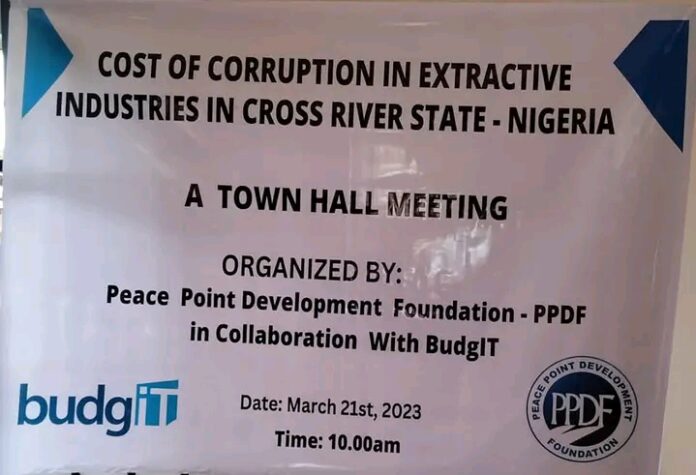By Kelvin Obambon
A non-governmental organization, Peace Point Development Foundation (PPDF), has organized a one-day town hall meeting on the cost of corruption in the extractive industries in Cross River State.
The event which took place on Tuesday at the Akim Qua Town Hall, Calabar, had participants drawn from communities hosting extractive industries, civil society organizations, traditional institutions, youth bodies and the media.
Coordinator of PPDF, Mr Umo Isua-Ikoh, in his remarks said that Peace Point Development Foundation alongside its partner, BudgIT, organized the town hall meeting to shed light on the corruption that is going on in extractive industries across the state.
According to him, “If you go to Biase there’s illegal mining going on there. There are also other places across the state which we know. Go to Mfamosing, illegal mining is going on, and there are environmental implications for this. So we call these communities let’s come together and dialogue to see how we can hold some of these companies to account for what they’ve done.
“Some of the mining companies have discovered a lot of resources in our communities. They fail to make it known to us because they are making interest from it, and they also don’t know how to extract it. All they need is the financial benefits at the detriments of the communities.
“In terms of environmental issues, most of the extractive sites will be left open. Sooner or later we will have a lot of landslides across the state base on this. So we need to start agitating for the communities to know what the companies are doing and also hold the miners accountable.”
Isua-Ikoh said that there was need for the government to come in and regulate activities of companies that are doing illegal mining in order to save the state from future disaster.
He further explained that Peace Point Development Foundation works in four thematic areas, covering environmental justice, peace building, human rights and good governance.
“We work mostly in hard-to-reach communities, empowering the people with information and set up structures at the community level that will enable them speak for themselves. We don’t speak for communities. We empower them to speak for themselves,” he said.
Meanwhile, in their separate presentations, Mr Kingsley Eworo from Budget Transparency and Accountability Network (BTAN) and Mr Anietie Akpan, South South Deputy Bureau Chief of the Guardian Newspaper, decried the rampant corruption that has eaten up the extractive industry sector in Cross River.
This, they concurred, has deprived the people of host communities the benefits from their God-given resources, and thus exposed them to the effects of environmental degradation occasioned by unregulated mining and exploration activities.
The resource persons blamed the situation on political leaders and community elders for making themselves pliable and easily influenced by mining companies to rip off the people’s common wealth.
They also flayed the “divide and rule” antics employed by mining companies to weaken community resistance to their illegal and exploitative activities.
They, however, noted that corruption in the extractive industries has its peculiar issues of human rights abuses, environmental degradation, conflicts, non-disclosure, infrastructural deficits, among others.
Some of the way forward suggested include coherent development strategy, beneficial ownership, free prior and informed consent, transparency, benefit transfer, domestic resource mobilization, contracts.
Others are; holding community leaders and mining companies accountable, setting up of community vanguard and the cultivation of community development mindset.









